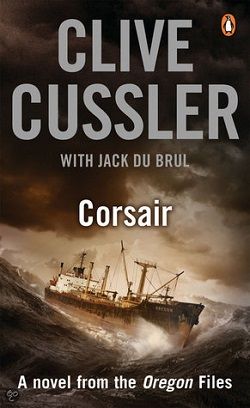Summary

Corsair (Oregon Files 6)
by Clive Cussler
Corsairs are pirates, and pirates come in many different varieties. There are the pirates who fought off the Barbary Coast in the late eighteenth and early nineteenth centuries, the contemporary pirates who infest the waters of Africa and Asia, and the pirates...who look like something else.
When the U.S. secretary of state’s plane crashes while bringing her to a summit meeting in Libya, the CIA, distrusting the Libyans, hire Juan Cabrillo to search for her, and their misgivings are well founded. The crew locates the plane, but the secretary of state has vanished. It turns out Libya’s new foreign minister has other plans for the conference, plans that Cabrillo cannot let happen. But what does it all have to do with a two- hundred- year-old naval battle and the centuries-old Islamic scrolls that the Libyans seem so determined to find? The answers will lead him full circle into history, and into another pitched battle on the sea, this time against Islamic terrorists, and with the fate of nations resting on its outcome.
.
Read
Corsair (Oregon Files 6) on http://kissnovel.net
Martial Peak Reviews
Corsair, the sixth installment in Clive Cussler's Oregon Files series, is a thrilling adventure that intertwines historical intrigue with contemporary geopolitical tensions. As with many of Cussler's works, this novel is rich in action, suspense, and a touch of historical mystery, making it a compelling read for fans of the genre. The narrative revolves around Juan Cabrillo and his crew aboard the Oregon, who are drawn into a high-stakes mission following the mysterious disappearance of the U.S. Secretary of State after her plane crashes in Libya.
The book opens with a gripping premise: the Secretary of State's plane goes down en route to a crucial summit, and the CIA, suspecting foul play, enlists Cabrillo's expertise to locate her. This setup not only establishes a sense of urgency but also introduces the reader to the complex world of international politics, where trust is a rare commodity. Cussler deftly navigates the murky waters of espionage, showcasing the tension between the U.S. and Libya, a country with a tumultuous history and a reputation for harboring nefarious elements.
One of the most striking aspects of Corsair is its exploration of the theme of piracy. Cussler cleverly plays with the concept of pirates throughout history, drawing parallels between the Barbary Coast pirates of the past and the modern-day threats posed by Islamic terrorists. This thematic depth adds layers to the narrative, prompting readers to consider the evolving nature of piracy and its implications in today's world. The inclusion of centuries-old Islamic scrolls as a central plot device further enriches the story, linking the present-day conflict to historical events and underscoring the idea that the past is never truly behind us.
Character development is another strong suit of Cussler's writing. Juan Cabrillo, the protagonist, is portrayed as a resourceful and resilient leader, embodying the qualities of a modern-day hero. His crew, a diverse group of skilled individuals, each brings their unique expertise to the table, creating a sense of camaraderie that is palpable throughout the narrative. Cussler takes the time to flesh out these characters, allowing readers to connect with them on a personal level. The interactions among the crew members are often laced with humor and banter, providing a welcome contrast to the high-stakes drama unfolding around them.
The pacing of Corsair is relentless, with Cussler expertly balancing action sequences with moments of introspection and character development. The plot twists and turns, keeping readers on the edge of their seats as Cabrillo and his team race against time to uncover the truth behind the Secretary's disappearance. Cussler's knack for crafting intricate plots is evident, as he weaves together multiple storylines that converge in a satisfying climax. The final showdown at sea is particularly thrilling, showcasing Cussler's ability to create tension and excitement in his writing.
Moreover, Cussler's vivid descriptions of the settings—from the treacherous waters of the Mediterranean to the historical backdrop of naval battles—transport readers into the heart of the action. His attention to detail enhances the immersive experience, allowing readers to visualize the scenes as they unfold. This aspect of his writing is reminiscent of authors like James Rollins and Steve Berry, who also blend history with adventure, but Cussler's distinctive voice and style set him apart in the genre.
While Corsair is undoubtedly an entertaining read, it also raises important questions about the nature of power and the lengths to which individuals and nations will go to achieve their goals. The motivations of the antagonists are explored, revealing a complex web of ambition, ideology, and desperation. This depth adds a layer of realism to the story, prompting readers to reflect on the moral ambiguities present in international relations.
In conclusion, Clive Cussler's Corsair is a masterful blend of adventure, history, and political intrigue. With its well-developed characters, fast-paced plot, and thought-provoking themes, it stands as a testament to Cussler's prowess as a storyteller. Fans of the Oregon Files series will find much to enjoy, while newcomers will be drawn in by the thrilling narrative and rich historical context. This novel not only entertains but also invites readers to ponder the complexities of our world, making it a worthwhile addition to any bookshelf.
























Reviews 0
Post a Reviews: